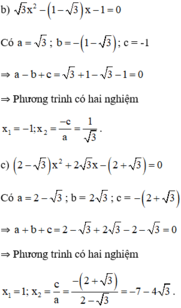1. a ( x-2 ) . (x2+1) =0
b.(x+1) .(x2 _4 ) =0
c.(1/2+1/3+1/4).(x-3) =0
Hãy nhập câu hỏi của bạn vào đây, nếu là tài khoản VIP, bạn sẽ được ưu tiên trả lời.

giải các Phương trình sau
a) (5x+3)(x2+1)(x-1)=0
b) (4x-1)(x-3)-(x-3)(5x+2)=0
c) (x+6)(3x-1)+x2-36 =0

a: =>(5x+3)(x-1)=0
=>x=1 hoặc x=-3/5
b: =>(x-3)(4x-1-5x-2)=0
=>(x-3)(-x-3)=0
=>x=-3 hoặc x=3
c: =>(x+6)(3x-1+x-6)=0
=>(x+6)(4x-7)=0
=>x=7/4 hoặc x=-6

Bài 10:
a) (x+2)2 -x(x+3) + 5x = -20
=> x2 + 4x + 4 - x2 - 3x + 5x = -20
=> 6x = -20 + (-4)
=> 6x = -24
=> x = -4
b) 5x3-10x2+5x=0
=>5x(x2-2x+1)=0
=>5x(x-1)2 =0
=> 5x=0 hoặc (x-1)2=0
=>x=0 hoặc x=1
c) (x2 - 1)3 - (x4 + x2 + 1)(x2 - 1) = 0
=> (x2 - 1)[(x2 - 1)2 - (x4 + x2 + 1)] = 0
<=> (x2 - 1)(x4 - 2x2 + 1 - x4 - x2 - 1) = 0
<=> (x2 - 1)(-3x2) = 0
<=> (x2 - 1)=0 hoặc (-3x2) =0
<=> x2=1 hoặc x2=0
<=> x=−1;1 hoặc x=0
d)
(x+1)3−(x−1)3−6(x−1)2=-19
⇔x3+3x2+3x+1−(x3−3x2+3x−1)−6(x2−2x+1)+19=0
⇔x3+3x2+3x+1−x3+3x2−3x+1−6x2+12x−6+19=0
⇔12x+13=0⇔12x+13=0
⇔12x=-13
⇔x=-23/12
Học tốt nhé:333![]()

\(a,\Leftrightarrow9x^2=-36\Leftrightarrow x\in\varnothing\\ b,\Leftrightarrow3\left(x+4\right)-x\left(x+4\right)=0\\ \Leftrightarrow\left(3-x\right)\left(x+4\right)=0\\ \Leftrightarrow\left[{}\begin{matrix}x=3\\x=-4\end{matrix}\right.\\ c,\Leftrightarrow2x^2-x-2x^2+3x+2=0\\ \Leftrightarrow2x=-2\Leftrightarrow x=-1\\ d,\Leftrightarrow\left(2x-3-2x\right)\left(2x-3+2x\right)=0\\ \Leftrightarrow-3\left(4x-3\right)=0\\ \Leftrightarrow x=\dfrac{3}{4}\\ e,\Leftrightarrow\dfrac{1}{3}x\left(x-9\right)=0\Leftrightarrow\left[{}\begin{matrix}x=0\\x=9\end{matrix}\right.\\ f,\Leftrightarrow x^2\left(x-1\right)-\left(x-1\right)=0\\ \Leftrightarrow\left(x^2-1\right)\left(x-1\right)=0\\ \Leftrightarrow\left(x-1\right)^2\left(x+1\right)=0\\ \Leftrightarrow\left[{}\begin{matrix}x=1\\x=-1\end{matrix}\right.\)

a) 1 , 5 x 2 – 1 , 6 x + 0 , 1 = 0
Có a = 1,5; b = -1,6; c = 0,1
⇒ a + b + c = 1,5 – 1,6 + 0,1 = 0
⇒ Phương trình có hai nghiệm x 1 = 1 ; x 2 = c / a = 1 / 15 .

d) ( m – 1 ) x 2 – ( 2 m + 3 ) x + m + 4 = 0
Có a = m – 1 ; b = - (2m + 3) ; c = m + 4
⇒ a + b + c = (m – 1) – (2m + 3) + m + 4 = m -1 – 2m – 3 + m + 4 = 0
⇒ Phương trình có hai nghiệm 

a) \(\left(x+2\right)^3-x^2\left(x+6\right)=0\)
\(\Leftrightarrow x^3+6x^2+12x+8-x^3-6x^2=0\)
\(\Leftrightarrow12x+8=0\)
\(\Leftrightarrow12x=-8\)
\(\Leftrightarrow x=-\dfrac{8}{12}\)
\(\Leftrightarrow x=-\dfrac{2}{3}\)
b) \(\left(2x+3\right)^3-8x\left(x+1\right)\left(x-1\right)=9x\left(4x-3\right)\)
\(\Leftrightarrow8x^3+36x^2+54x+27-8x\left(x^2-1\right)=36x^2-27x\)
\(\Leftrightarrow8x^3+36x^2+54x+27-8x^3+8x=36x^2-27x\)
\(\Leftrightarrow8x^3-8x^3+36x^2-36x^2+54x+27x+8x+27=0\)
\(\Leftrightarrow89x+27=0\)
\(\Leftrightarrow x=-\dfrac{27}{89}\)
c) \(\left(2-x\right)^3+\left(2+x\right)^3-12x\left(x+1\right)=0\)
\(\Leftrightarrow8-12x+6x^2-x^3+8+12x+6x^2+x^3-12x^2-12x=0\)
\(\Leftrightarrow\left(x^3-x^3\right)+\left(6x^2+6x^2-12x^2\right)-\left(12x-12x\right)+12x+\left(8+8\right)=0\)
\(\Leftrightarrow12x+16=0\)
\(\Leftrightarrow x=-\dfrac{16}{12}\)
\(\Leftrightarrow x=-\dfrac{4}{3}\)
`#040911`
`a)`
`(x + 2)^3 - x^2(x + 6) = 0`
`<=> x^3 + 6x^2 + 12x + 8 - x^3 - 6x^2 = 0`
`<=> (x^3 - x^3) + (6x^2 - 6x^2) + 12x = 0`
`<=> 12x = 0`
`<=> x = 0`
Vậy, `x = 0.`
`b)`
`(2x + 3)^3 - 8x(x - 1)(x + 1) = 9x(4x - 3)`
`<=> 8x^3 + 36x^2 + 54x + 27 - 8x(x^2 - 1) = 36x^2 - 27x`
`<=> 8x^3 + 36x^2 + 54x + 27 - 8x^3 + 8x - 36x^2 + 27x = 0`
`<=> (8x^3 - 8x^3) + (36x^2 - 36x^2) + (54x + 8x + 27x) + 27 = 0`
`<=> 89x + 27 = 0`
`<=> 89x = -27`
`<=> x = -27/89`
Vậy, `x = -27/89`
`c)`
`(2 - x)^3 + (2 + x)^3 - 12x(x + 1) = 0`
`<=> 8 - 12x + 6x^2 - x^3 + 8 + 12x + 6x^2 + x^3 - 12x^2 - 12x = 0`
`<=> (-x^3 + x^3) + (12x - 12x - 12x) + (6x^2 + 6x^2 - 12x^2) + (8 + 8)=0`
`<=> -12x + 16 = 0`
`<=> -12x = -16`
`<=> 12x = 16`
`<=> x=4/3`
Vậy, `x = 4/3.`

a) Ta có: \(\left(x^2-5x\right)^2+10\left(x^2-5x\right)+24=0\)
\(\Leftrightarrow\left(x^2-5x\right)^2+4\left(x^2-5x\right)+6\left(x^2-5x\right)+24=0\)
\(\Leftrightarrow\left(x^2-5x\right)\left(x^2-5x+4\right)+6\left(x^2-5x+4\right)=0\)
\(\Leftrightarrow\left(x^2-5x+6\right)\left(x^2-5x+4\right)=0\)
\(\Leftrightarrow\left(x^2-2x-3x+6\right)\left(x^2-x-4x+4\right)=0\)
\(\Leftrightarrow\left[x\left(x-2\right)-3\left(x-2\right)\right]\left[x\left(x-1\right)-4\left(x-1\right)\right]=0\)
\(\Leftrightarrow\left(x-1\right)\left(x-2\right)\left(x-3\right)\left(x-4\right)=0\)
\(\Leftrightarrow\left[{}\begin{matrix}x-1=0\\x-2=0\\x-3=0\\x-4=0\end{matrix}\right.\Leftrightarrow\left[{}\begin{matrix}x=1\\x=2\\x=3\\x=4\end{matrix}\right.\)
Vậy: S={1;2;3;4}
b) Ta có: \(\left(2x+1\right)^2-2x-1=2\)
\(\Leftrightarrow\left(2x+1\right)^2-\left(2x+1\right)-2=0\)
\(\Leftrightarrow\left(2x+1\right)^2-2\left(2x+1\right)+\left(2x+1\right)-2=0\)
\(\Leftrightarrow\left(2x+1\right)\left(2x+1-2\right)+\left(2x+1-2\right)=0\)
\(\Leftrightarrow\left(2x+1+1\right)\left(2x-1\right)=0\)
\(\Leftrightarrow\left(2x+2\right)\left(2x-1\right)=0\)
\(\Leftrightarrow\left[{}\begin{matrix}2x+2=0\\2x-1=0\end{matrix}\right.\Leftrightarrow\left[{}\begin{matrix}2x=-2\\2x=1\end{matrix}\right.\Leftrightarrow\left[{}\begin{matrix}x=-1\\x=\dfrac{1}{2}\end{matrix}\right.\)
Vậy: \(S=\left\{-1;\dfrac{1}{2}\right\}\)
c) Ta có: \(x\left(x-1\right)\left(x^2-x+1\right)-6=0\)
\(\Leftrightarrow x\left(x^3-x^2+x-x^2+x-1\right)-6=0\)
\(\Leftrightarrow x\left(x^3-2x^2+2x-1\right)-6=0\)
\(\Leftrightarrow x^4-2x^3+2x^2-x-6=0\)
\(\Leftrightarrow x^4-2x^3+2x^2-4x+3x-6=0\)
\(\Leftrightarrow x^3\left(x-2\right)+2x\left(x-2\right)+3\left(x-2\right)=0\)
\(\Leftrightarrow\left(x-2\right)\left(x^3+2x+3\right)=0\)
\(\Leftrightarrow\left(x-2\right)\left(x^3-x+3x+3\right)=0\)
\(\Leftrightarrow\left(x-2\right)\left[x\left(x^2-1\right)+3\left(x+1\right)\right]=0\)
\(\Leftrightarrow\left(x-2\right)\left[x\left(x-1\right)\left(x+1\right)+3\left(x+1\right)\right]=0\)
\(\Leftrightarrow\left(x-2\right)\left(x+1\right)\left(x^2-x+3\right)=0\)
mà \(x^2-x+3>0\forall x\)
nên (x-2)(x+1)=0
\(\Leftrightarrow\left[{}\begin{matrix}x-2=0\\x+1=0\end{matrix}\right.\Leftrightarrow\left[{}\begin{matrix}x=2\\x=-1\end{matrix}\right.\)
Vậy: S={2;-1}
d) Ta có: \(\left(x^2+1\right)^2+3x\left(x^2+1\right)+2x^2=0\)
\(\Leftrightarrow\left(x^2+1\right)^2+2x\left(x^2+1\right)+x\left(x^2+1\right)+2x^2=0\)
\(\Leftrightarrow\left(x^2+1\right)\left(x^2+1+2x\right)+x\left(x^2+1+2x\right)=0\)
\(\Leftrightarrow\left(x+1\right)^2\cdot\left(x^2+x+1\right)=0\)
mà \(x^2+x+1>0\forall x\)
nên x+1=0
hay x=-1
Vậy: S={-1}

Bài 1:
a) (3x - 2)(4x + 5) = 0
<=> 3x - 2 = 0 hoặc 4x + 5 = 0
<=> 3x = 2 hoặc 4x = -5
<=> x = 2/3 hoặc x = -5/4
b) (2,3x - 6,9)(0,1x + 2) = 0
<=> 2,3x - 6,9 = 0 hoặc 0,1x + 2 = 0
<=> 2,3x = 6,9 hoặc 0,1x = -2
<=> x = 3 hoặc x = -20
c) (4x + 2)(x^2 + 1) = 0
<=> 4x + 2 = 0 hoặc x^2 + 1 # 0
<=> 4x = -2
<=> x = -2/4 = -1/2
d) (2x + 7)(x - 5)(5x + 1) = 0
<=> 2x + 7 = 0 hoặc x - 5 = 0 hoặc 5x + 1 = 0
<=> 2x = -7 hoặc x = 5 hoặc 5x = -1
<=> x = -7/2 hoặc x = 5 hoặc x = -1/5
a/ (x-2) . (x2+1) = 0
<=> x-2=0 hoặc x2+1=0 (vô lí)
<=> x=2
b/ (x+1) . (x2-4) = 0
<=> x+1=0 hoặc x2-4=0
<=> x=-1 hoặc x2=4
<=> x=-1 hoặc x=2 hoặc x=-2
c/ (1/2 + 1/3 + 1/4) . (x-3) = 0
<=> x-3=0 (vì 1/2 + 1/3 + 1/4 \(\ne\) )
<=> x=3
a) x-2=0 hoặc x^2+1=0
x=2 và x=rỗng
b) (x-1)(x-2)(x+2)=0
x=1 và x=2 và x=-2